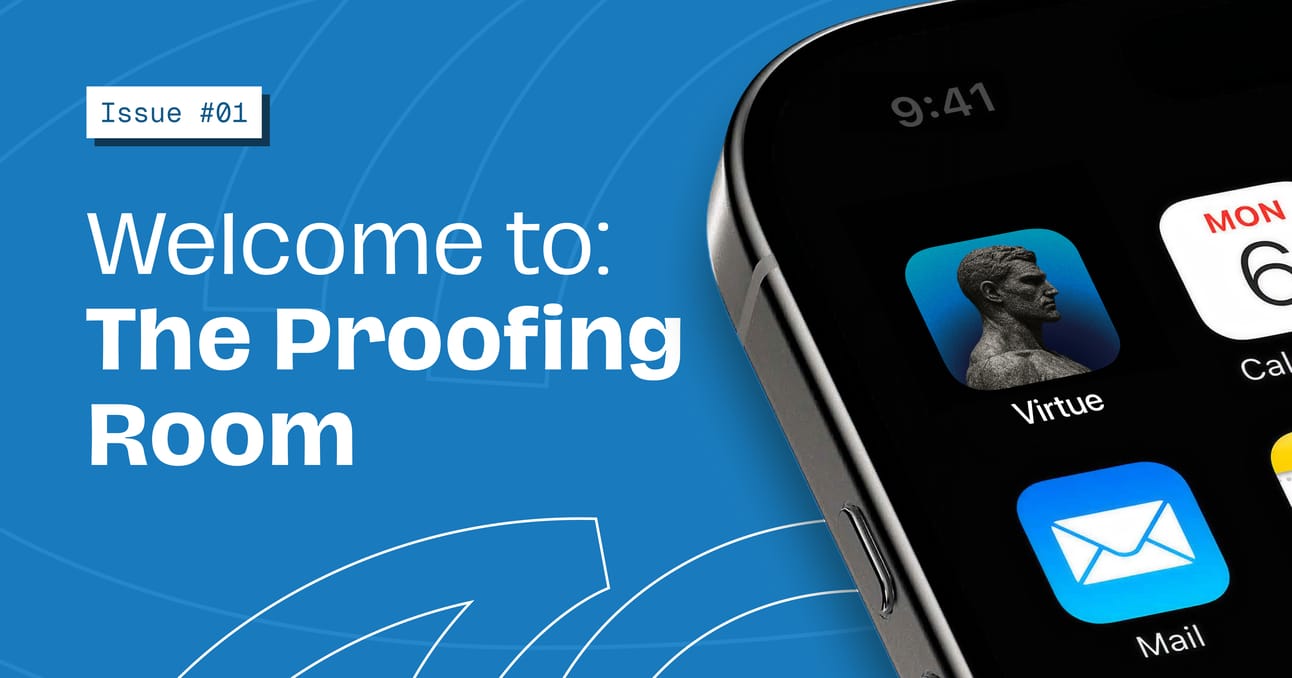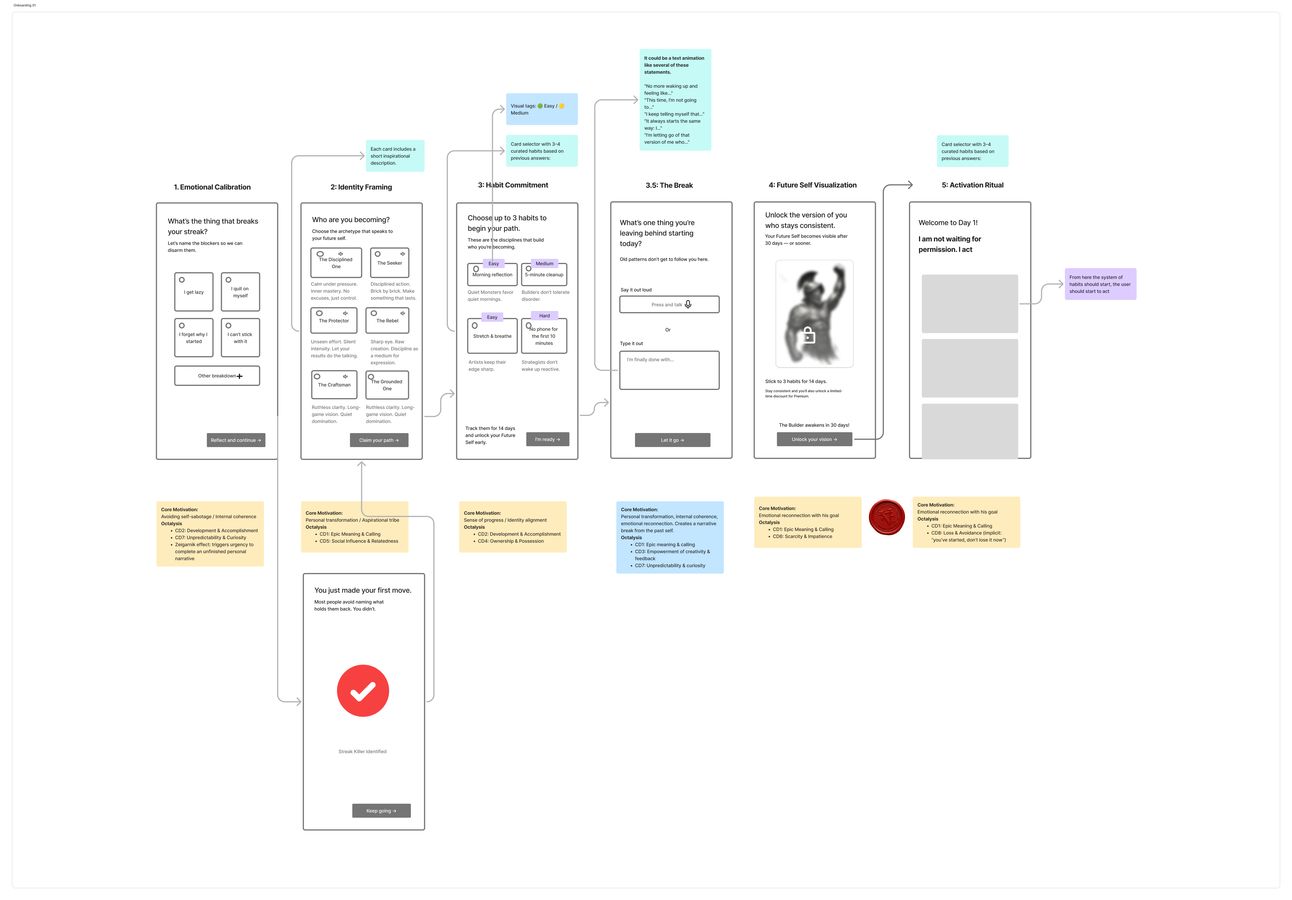
We’re Live!
Hey there,
Thanks for joining us on this ambitious (and frankly, terrifying) journey. If you saw our announcements on social media today, you already know we're building Virtue for iOS - our first 30-day product in The Proofing Room series.
But now we're pulling back the curtain to show you how the torta actually gets made.
|
D.B. Fresh
|
|
Why We're Building Virtue
Before diving into the product details, I want to share why this matters so deeply to us.
For Alan, this is personal. As he shared today: "Therapy didn't fix me. Pills didn't fix me. But finding alignment with who I'm meant to be did". After struggling through 2017, he found that alignment with virtue - not happiness, not comfort - was what rebuilt him.
For me, it was different but related. It wasn't until recently that I realized how much of my life had been spent trying to please others rather than building something authentic. That's a large reason why I started Torta Studios with Alan. This company, if I'm being honest, is an extension and expression of my ability to be externally aligned with who I'm meant to be internally. That's why we feel passionate about building a product that can help others find this same alignment.
That's Virtue in a nutshell - a tool for becoming someone you can respect when you look at yourself in the mirror.
Behind the Scenes: Our First Week
Since kickoff, we've been focused on three critical areas for our iOS app:
1. Identity Frameworks & User Motivation

The love child of psychology and gamification
We spent Monday and part of today mapping core motivations for our target user. After interviewing potential users and doing some deep thinking, we identified four motivation groups:
Identity & Purpose: Users seeking personal transformation, internal coherence, and aspirational identity
Control & Autonomy: Users wanting self-discipline without rigidity and ways to avoid self-sabotage
Progress & Emotional Motivation: Users needing emotional reconnection with goals and tangible progress
Community Driven: (Still in progress - we're gathering more data here)
2. Onboarding Flow Development
We're designing an onboarding experience that's fundamentally different from typical habit trackers. The process has been intense, with three key insights driving our approach:
Identity First, Habits Second: Most apps start with what you want to do. We're starting with who you want to become. This shifts the entire user experience from task completion to character development.
Emotional Calibration Matters: We discovered that understanding what derails users (like perfectionism or loss of motivation) allows us to tailor the experience to address their specific obstacles.
The Power of Commitment Rituals: We're creating a clear "line in the sand" moment where users actively commit to transformation, not just tracking habits.
The biggest challenge? Balancing aspirational identity with practical daily actions. We're iterating on how to make this connection seamless.
3. Technical Foundation & Early Testing
We're building on SwiftUI + SwiftData for iOS only (sorry Android users - depending on how this goes, we might expand later). We've also established our core systems:
7 Virtues Framework: Drawing from Roman philosophy for habit categorization
Character Leveling & Development System: Focused on alignment rather than just streak counting
Minimalist UI with Roman-inspired elements: Creating visual coherence with the philosophical foundation
We're aiming to get 50 early testers this week - a stretch goal that's making our palms sweat, but we're committed to getting real feedback early.
|
D.B. Fresh
|
|
What's Next: The Road to Issue #2
Between now and Friday, we'll be:
Finalizing the identity archetypes with specific habit recommendations for each
Implementing the core screens of the onboarding flow
Recruiting our first batch of testers (reply to this email if you want early access!)
One crucial decision we're wrestling with: How explicit should we be about the Roman virtues? We don't want to come across as pretentious philosophy bros, but we believe there's power in these time-tested concepts.
The Scary Truth About Building in Public
Let's be honest - doing this in 30 days is ambitious as hell. Most products take months or years. We're compressing that timeline dramatically, which means:
We'll have to make tough scope decisions daily
Some features won't make the cut
We'll likely pivot at least once based on early feedback
But that's the whole point of The Proofing Room. We're not trying to create a perfect product in secret. We're showing the messy, iterative process of bringing an idea to life.
Help Us Build in Public
If you know someone who might resonate with this approach - whether they're interested in product development, men's wellness, or the concept of virtue-based growth - we'd appreciate you forwarding this email.
Next issue drops Friday with our first user testing insights and the inevitable pivots they'll inspire.
Thanks for following along,
— Colin, Alan, & David (oh, and DB Fresh)
P.S. Reply with your thoughts on our approach. Too ambitious? Just right? We'd love your input as we refine it.
